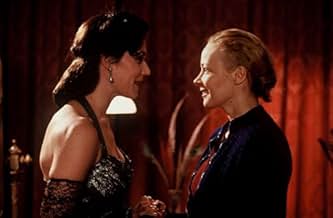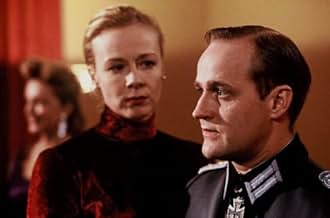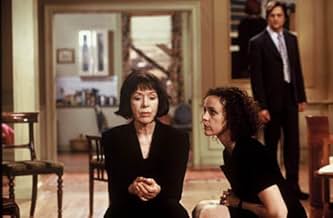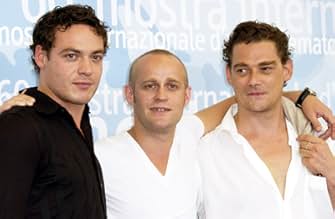NOTE IMDb
6,7/10
2,6 k
MA NOTE
Après le décès de son père, Hannah s'inquiète du comportement étrange de sa mère. Après des révélations sur l'enfance perturbée de sa mère, Hannah réalise qu'elle en savait très peu sur elle... Tout lireAprès le décès de son père, Hannah s'inquiète du comportement étrange de sa mère. Après des révélations sur l'enfance perturbée de sa mère, Hannah réalise qu'elle en savait très peu sur elle.Après le décès de son père, Hannah s'inquiète du comportement étrange de sa mère. Après des révélations sur l'enfance perturbée de sa mère, Hannah réalise qu'elle en savait très peu sur elle.
- Réalisation
- Scénario
- Casting principal
- Récompenses
- 9 victoires et 3 nominations au total
Avis à la une
'A ray of light in hard times' - this is how one of the main heroines characterizes the events described in 'Rosenstrasse', the 2003 film directed by Margarethe von Trotta. The episode took place in February-March 1943 and was one of the few, if not the only, public protest in Nazi Germany against the deportation and extermination of the Jews. The demonstrations took place on Berlin's Roses Street (hence the name of the film) where hundreds of Jews who were to be deported to concentration and extermination camps were held in a former Jewish welfare center. They were organized by the non-Jewish wives of the arrested men, mixed couples having a special status in the context of the racial laws (the Nurenberg laws). This unique public display of solidarity with the Jewish population (albeit motivated by family ties) led to the release of about 1,800 Jews, most of whom survived the war. In German history, the episode is considered as proof that 'it could have been otherwise' and presented as one of the few moments of anti-Nazi civil resistance.
The screenplay (co-written by Margarethe von Trotta and Pamela Katz) is conceived as a journey into family history and rediscovery of identity that is undertaken more than 50 years after the war by Hannah Weinstein, a young Jewish New Yorker. Her mother, about whose biography the daughter knows very little, except that she came to the United States as a child after the war, seems to go through a crisis of identity radicalization, deciding to mourn her deceased husband according to the laws of Jewish orthodoxy and opposing vehemently Hannah's marriage to a young non-Jew. With the help of a cousin who came to her father's funeral, Hannah begins to retrace her mother's biography and discovers that the 8-year-old Jewish girl had been rescued and sheltered during the last years of the war by Lena Fischer, a woman descended from the German aristocracy, who in turn was married to a Jew. Lena still lives in Berlin, and Hannah will travel to meet her. From here, the story of the events in Rosenstrasse is reconstructed through flash-backs that visually translate the accounts of the woman who, almost 60 years ago, had participated in the protests to save her husband, had met and taken under her protection the Jewish girl, remained alone in the world after her mother's deportation.
Margarethe von Trotta is a multi-talented filmmaker - actress, screenwriter, director - who spent the first years of her career in the milieus of the French New Wave and then the German New Cinema, to establish herself in the following decades with films and roles in which she analyzes (especially) German history and brings into debate important figures and moments, some not without controversy. 'Rosenstrasse' is an important film in its very subject matter, but it is an uneven film in its achievement. The most powerful part seemed to me to be the individual stories that reconstruct destinies - many tragic - broken by war and the horrors of the Holocaust. It is the secondary characters, some of whom only appear in a scene or two, that have the best chance of remaining in the viewers' memory. The contemporary plot and especially the episodes set in America don't hold up as solidly and are based too much on stereotypes. As in all of the director's films, the prominent characters are women and the actresses are given the opportunity for solid roles. Maria Schrader (herself a remarkable director and actress) is excellent as the woman on a quest for the truth about her family history and her own identity. Katja Riemann and Doris Schade interpret the role of Lena at both ages with aplomb and dignity. I was less impressed by Jutta Lampe as the mother. The way her role is written does not clarify either her supposed identity crisis or the radical change that occurs towards the end. The episode of the flirtation with Goebbels, which would have led to the release of the prisoners, has been widely criticized, especially in Germany, because it appears to downplay the impact of the women's protests. I think these criticisms are justified, although it seems that, historically, it was indeed Goebbels who ordered the release of the prisoners. Franz Rath's cinematography differentiates the leaps into the past by shooting in gray and metallic shades, almost black and white. 'Rosenstrasse' remains an interesting and important film both for its subject matter and for the discussions it has generated and will continue to generate.
The screenplay (co-written by Margarethe von Trotta and Pamela Katz) is conceived as a journey into family history and rediscovery of identity that is undertaken more than 50 years after the war by Hannah Weinstein, a young Jewish New Yorker. Her mother, about whose biography the daughter knows very little, except that she came to the United States as a child after the war, seems to go through a crisis of identity radicalization, deciding to mourn her deceased husband according to the laws of Jewish orthodoxy and opposing vehemently Hannah's marriage to a young non-Jew. With the help of a cousin who came to her father's funeral, Hannah begins to retrace her mother's biography and discovers that the 8-year-old Jewish girl had been rescued and sheltered during the last years of the war by Lena Fischer, a woman descended from the German aristocracy, who in turn was married to a Jew. Lena still lives in Berlin, and Hannah will travel to meet her. From here, the story of the events in Rosenstrasse is reconstructed through flash-backs that visually translate the accounts of the woman who, almost 60 years ago, had participated in the protests to save her husband, had met and taken under her protection the Jewish girl, remained alone in the world after her mother's deportation.
Margarethe von Trotta is a multi-talented filmmaker - actress, screenwriter, director - who spent the first years of her career in the milieus of the French New Wave and then the German New Cinema, to establish herself in the following decades with films and roles in which she analyzes (especially) German history and brings into debate important figures and moments, some not without controversy. 'Rosenstrasse' is an important film in its very subject matter, but it is an uneven film in its achievement. The most powerful part seemed to me to be the individual stories that reconstruct destinies - many tragic - broken by war and the horrors of the Holocaust. It is the secondary characters, some of whom only appear in a scene or two, that have the best chance of remaining in the viewers' memory. The contemporary plot and especially the episodes set in America don't hold up as solidly and are based too much on stereotypes. As in all of the director's films, the prominent characters are women and the actresses are given the opportunity for solid roles. Maria Schrader (herself a remarkable director and actress) is excellent as the woman on a quest for the truth about her family history and her own identity. Katja Riemann and Doris Schade interpret the role of Lena at both ages with aplomb and dignity. I was less impressed by Jutta Lampe as the mother. The way her role is written does not clarify either her supposed identity crisis or the radical change that occurs towards the end. The episode of the flirtation with Goebbels, which would have led to the release of the prisoners, has been widely criticized, especially in Germany, because it appears to downplay the impact of the women's protests. I think these criticisms are justified, although it seems that, historically, it was indeed Goebbels who ordered the release of the prisoners. Franz Rath's cinematography differentiates the leaps into the past by shooting in gray and metallic shades, almost black and white. 'Rosenstrasse' remains an interesting and important film both for its subject matter and for the discussions it has generated and will continue to generate.
I went to see the movie for two reasons: 1) Katha Riemann was given a prize for her role in Venice and 2) The story - the rescue of hundreds of Berlin jews, who had been rounded up for deportation in the spring of 1943 - and were being kept by the Gestapo in Rosenstrasse (Rose Street) - is important. The deportation was halted by the non-jewish partners and friends who demonstrated in front of the detainment centre.
However, Trottas movie is extremely disappointing, a pamphlet put on celluloid. The movie is intended to be GOOD, the main characters are intended to be GOOD, the nazis are just EVIL, lustful or downright stupid. Maria Schrader is supposed to be a young jewish New Yorker, trying to understand the unspoken traumas of her German-born mother who survived Rosenstrasse - but never succeeds in convincing me, that she is American. (There is something about her body-language which is much too Continental). Extremely annoying is the use of German in the US scenes....spiced with a few choice english words or sentences which seem totally out of place.
Katja Riemann does add a bit more life to her character - a Preussian baroness and talented pianist, who rescues her jewish husband. (Does she really have to f*** propaganda minister Goebbels to get hubby away from Gestapo- and does Goebbels really have to be portrayed as a - cartoonish - lustful little salivating man, forever chasing a bit of tail, and so plainly disgusting).
We all know Goebbels was a war criminal - but it would have been so more interesting, if the characters were REAL people and the story not just a study in black and white with a stilted dialogue.
However, Trottas movie is extremely disappointing, a pamphlet put on celluloid. The movie is intended to be GOOD, the main characters are intended to be GOOD, the nazis are just EVIL, lustful or downright stupid. Maria Schrader is supposed to be a young jewish New Yorker, trying to understand the unspoken traumas of her German-born mother who survived Rosenstrasse - but never succeeds in convincing me, that she is American. (There is something about her body-language which is much too Continental). Extremely annoying is the use of German in the US scenes....spiced with a few choice english words or sentences which seem totally out of place.
Katja Riemann does add a bit more life to her character - a Preussian baroness and talented pianist, who rescues her jewish husband. (Does she really have to f*** propaganda minister Goebbels to get hubby away from Gestapo- and does Goebbels really have to be portrayed as a - cartoonish - lustful little salivating man, forever chasing a bit of tail, and so plainly disgusting).
We all know Goebbels was a war criminal - but it would have been so more interesting, if the characters were REAL people and the story not just a study in black and white with a stilted dialogue.
Goebbels motivation in backing down was not explored. In the aftermath of Stalingrad the Reich had decided to go for 'total war'. This is referred to in the film. Part of this was to use women in the war effort, which Germany had not previously done to any great extent. An SS massacre of women would have faced Goebbels with a public relations disaster of massive proportion. His preference was to make the problem go away as quietly as possible, on the basis that the Jewish men could always be rounded up later. I understand the majority survived the war.
His other problem was that the 'Red' Berlin had never been very enthusiastically behind the Nazi cause and had to be handled cautiously. Again a massacre of women could have cost the Nazis what mediocre level of support they had in their capital city.
It was interesting that the majority of SS uniforms showed patches which indicated that the men wearing them were not of German nationality, but were from German origins in other countries such as Lithuania or Latvia
His other problem was that the 'Red' Berlin had never been very enthusiastically behind the Nazi cause and had to be handled cautiously. Again a massacre of women could have cost the Nazis what mediocre level of support they had in their capital city.
It was interesting that the majority of SS uniforms showed patches which indicated that the men wearing them were not of German nationality, but were from German origins in other countries such as Lithuania or Latvia
"Rosenstrasse" is a defense of naive Righteous Gentiles, the women who married secular Jews in Germany as the Nazis rose to power.
Like "The Pianist," it goes out of its way to distinguish between Nazis and natives who thought this too shall pass and noble Prussian culture would again assert itself (I couldn't pick up all the cultural references, particularly in the German music selections, though soldiers are seen dancing to Cole Porter songs.).
While the promotion for the film claims that feminist director Margarethe von Trotta is the first to deal with this particular slice of German protest to the Nazi eradication of Jews, a series of German films not otherwise distributed in the U.S. were shown on PBS some years ago and demonstrated that other post-war filmmakers were looking at complicity and professed ignorance among their country people, and that their discovery of their parents' hypocrisy led to the radical politics of 1968.
Von Trotta carefully avoids this context by oddly having her seeker of truth be a young American woman who grew up speaking German fluently in the German Jewish emigre enclave of Washington Heights in Manhattan (from whence came Henry Kissinger) and has a South American boyfriend.
Somewhat clumsily for the narrative and for the family, her father's death leads her to investigate her mother's past in Germany to try and figure out why her cold, secular mother is suddenly following shiva (Jewish mourning rituals) for him. (These rituals are disconcertingly portrayed inaccurately -- What rule of silence? Everyone would be talking about memories of the deceased, and eating and eating-- unless the point is to show they don't know how to follow Jewish tradition anymore and talk of any past is verboten in this family).
The film unravels, not particularly satisfactorily, many layers of irony and guilt as personal and political realities are intertwined --
between Germans (especially soldiers who had witnessed what the S.S. was doing in the East, showing it was not a secret at home); between gentiles and Jews (particularly about intermarriage then and now); between survivors and the dead; between men and women (there's an assertion that gentile men deserted their Jewish wives to their fates while gentile women did not desert their spouses); between mothers and children, whether biologically linked or not; between siblings, and,between chance and choice.
Katja Riemann's strong performance as the stubborn wife who accidentally becomes an activist by default almost puts aside the fact that her character was monumentally oblivious to what was happening around her until it was almost too late by a thread.
The conclusion seems to come out in favor of compromise as it explores love and tradition, which is inevitably not happy for everyone but may be a flexible response to a complicated past and present.
Like "The Pianist," it goes out of its way to distinguish between Nazis and natives who thought this too shall pass and noble Prussian culture would again assert itself (I couldn't pick up all the cultural references, particularly in the German music selections, though soldiers are seen dancing to Cole Porter songs.).
While the promotion for the film claims that feminist director Margarethe von Trotta is the first to deal with this particular slice of German protest to the Nazi eradication of Jews, a series of German films not otherwise distributed in the U.S. were shown on PBS some years ago and demonstrated that other post-war filmmakers were looking at complicity and professed ignorance among their country people, and that their discovery of their parents' hypocrisy led to the radical politics of 1968.
Von Trotta carefully avoids this context by oddly having her seeker of truth be a young American woman who grew up speaking German fluently in the German Jewish emigre enclave of Washington Heights in Manhattan (from whence came Henry Kissinger) and has a South American boyfriend.
Somewhat clumsily for the narrative and for the family, her father's death leads her to investigate her mother's past in Germany to try and figure out why her cold, secular mother is suddenly following shiva (Jewish mourning rituals) for him. (These rituals are disconcertingly portrayed inaccurately -- What rule of silence? Everyone would be talking about memories of the deceased, and eating and eating-- unless the point is to show they don't know how to follow Jewish tradition anymore and talk of any past is verboten in this family).
The film unravels, not particularly satisfactorily, many layers of irony and guilt as personal and political realities are intertwined --
between Germans (especially soldiers who had witnessed what the S.S. was doing in the East, showing it was not a secret at home); between gentiles and Jews (particularly about intermarriage then and now); between survivors and the dead; between men and women (there's an assertion that gentile men deserted their Jewish wives to their fates while gentile women did not desert their spouses); between mothers and children, whether biologically linked or not; between siblings, and,between chance and choice.
Katja Riemann's strong performance as the stubborn wife who accidentally becomes an activist by default almost puts aside the fact that her character was monumentally oblivious to what was happening around her until it was almost too late by a thread.
The conclusion seems to come out in favor of compromise as it explores love and tradition, which is inevitably not happy for everyone but may be a flexible response to a complicated past and present.
Film is a cultural product more or less reflecting the trend of a time. Thus, I was made alert when I was watching this slow-tuned movie. Why in such a sudden in the past few years, movies like "Rosenstraße" depicting the humane behaviour of the Germans at wartime mushroom? "The Pianist", "Der Untergang" join the rally.
People may say, "Time heals!" "We need to do justice to the German". True, true, true, doubtlessly, there must have been German citizens who were holding opposing ideas against the Nazi government's. There must be kind-hearted and righteous Germans who protected Jewish people and later got persecuted by their own people. And there is a need to make movies reflecting the true historical facts. These films are 100% not party or government propaganda. My concern here is "timing". Tellingly, why didn't these movies come up in the 70's, 80's or 90's? But early 21st Century when the Neo-Nazi is rising quietly bit by bit today in Germany. I cannot but easily associate these movies to what is really happening in this country.
People may say, "Time heals!" "We need to do justice to the German". True, true, true, doubtlessly, there must have been German citizens who were holding opposing ideas against the Nazi government's. There must be kind-hearted and righteous Germans who protected Jewish people and later got persecuted by their own people. And there is a need to make movies reflecting the true historical facts. These films are 100% not party or government propaganda. My concern here is "timing". Tellingly, why didn't these movies come up in the 70's, 80's or 90's? But early 21st Century when the Neo-Nazi is rising quietly bit by bit today in Germany. I cannot but easily associate these movies to what is really happening in this country.
Le saviez-vous
- AnecdotesIt took Margarethe von Trotta almost 10 years to realize this project for financial reasons.
- ConnexionsFeatured in Katja Riemann (2006)
- Bandes originalesSonata for Piano and Violin in A
'Allegretto Moderato' - César Franck (op. 446 198 2)
Courtesy of UNIVERSAL CLASSICS & JAZZ - a division of UNIVERSAL MUSIC GmbH
Meilleurs choix
Connectez-vous pour évaluer et suivre la liste de favoris afin de recevoir des recommandations personnalisées
- How long is Rosenstrasse?Alimenté par Alexa
Détails
Box-office
- Montant brut aux États-Unis et au Canada
- 734 519 $US
- Montant brut mondial
- 6 075 609 $US
- Durée2 heures 16 minutes
- Couleur
- Mixage
- Rapport de forme
- 2.35 : 1
Contribuer à cette page
Suggérer une modification ou ajouter du contenu manquant






































